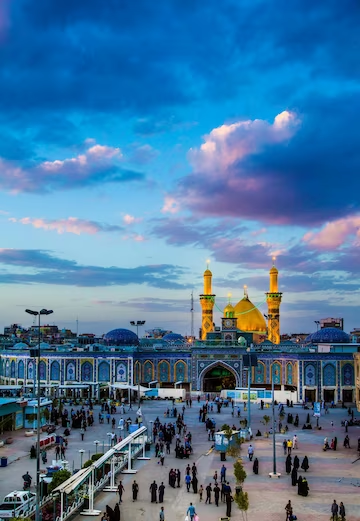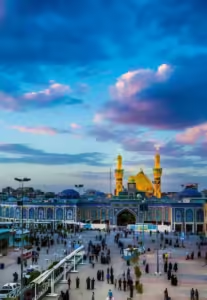

Muharram ul Haram
Muharram ul Haram , the first month of the Islamic lunar calendar, holds great religious and historical significance for Muslims around the world. Along with Rajab, Dhul-Qadah, and Dhul-Hijjah, it is considered one of the four holiest months in Islam. Ashura, the tenth day of the month of Muharram, is especially important. It honors many occasions, most notably the martyrdom of Imam Husain Ibn Ali, grandson of Prophet Muhammad, and his companions at the battle of Karbala in 680. Shia Muslims commemorate the sacrifices of Imam Husain and his followers with mourning rituals and feasting. They mourn in depth. Muharram ul Haram is the anniversary of the battle of Karbala .we respect the month of the Muharram .we respect for the sacrifice made of imam Hussain (as) and his family members and followers.
Hijri Calendar
The Islamic calendar, commonly referred to as the Lunar or Hijri calendar, is used by Muslims worldwide to calculate the dates of religious celebrations and events.
Twelve lunar months make up the Islamic calendar; a new month starts when a new moon is seen.
Muharram ul Haram is the first month of the Islamic calendar, sometimes referred to as the Hijri calendar. Muharram is regarded as the Islamic lunar calendar’s first month.
First Month of Hijri Calendar
Muharram ul Haram is the first month of the Islamic calendar, commonly referred to as the Hijri calendar. In Islam, it is regarded as one of the holy months. The Prophet Muhammad’s migration (Hijra) from Mecca to Medina in 622 CE, which signifies the beginning of the Islamic period, is the starting point for the Islamic calendar. Muharram also holds a greater significance .Muharram is also more significant because it is one of the four holy months, as the holy Qur’an tells us.
Virtues of Muharam ul Haram
Muharram ul Haram, the first month of the Islamic lunar calendar, holds significant virtues in Islam. Muharram ul Haram, the month of Allah, is a wonderful and auspicious month. It is one of the holy months, the first of the Hijri year, and Allah states (interpretation of the meaning) of it:
As Allah decreed on the Day of Creation of the heavens and the earth, there are twelve months in a year when dealing with Him; four of these months are considered sacred, meaning they are the first, seventh, eleventh, and twelfth months in the Islamic calendar. You are not incorrect in that faith; it is the correct one. (Soourat at-Tawbah, 9:36).
“The year is twelve months,” the Prophet (peace and blessings of Allah be upon him) narrated Abu Bakr (may Allah be pleased with him).Four of the twelve months of the year—three in a row, Dhu al-Qa’dah, Dhu al-Hijjah and al-Muharram, and Rajab of Mudar, which falls between Jumada and Sha’ban—are considered sacred. (Al-Bukhari’s narration, 2958) .
Virtues of 10 Muharam ul Haram
In Islam, Ashura, or the tenth day of Muharram ul Haram , is associated with particular values and significance. Every year, some days are more moral than others. The 10th of Muharram , also referred to as the day of Ashura, is one such day.
Significance of Ashura
Ashura is an important Islamic holiday with theological and historical significance for both Sunni and Shia Muslims. Though they may mark it differently. Ashura commemorates several important occasions in Islamic history.
Ashura is a Sunni Muslim holiday celebrating the day the Red Sea parted, freeing the Israelites and Prophet Moses (Musa) from the oppressive rule of Pharaoh.
Ashura is mostly celebrated by Shia Muslims to remember the martyrdom of Imam Hussein ibn Ali, the Prophet Muhammad’s grandson, and his companions at the Battle of Karbala in 680 AD. Shia identity and theology are centered on this event.
Battle of Karbala
The Battle of Karbala, which took place in Iraq in Muharram 61 AH, was the most important event that happened in the month of Muharram.
It was fought between a considerably bigger army dispatched by Yazid ibn Muawiyah, the Umayyad Caliph at the time, and a tiny army made up of the family and allies of Imam Hussain (AS), the grandson of the Prophet (PBUH).
The reason for the conflict was Imam Hussain’s (AS) refusal to swear allegiance to Yazid ibn Muawiyah, a despotic monarch who had assumed the role of Muslim leader following the death of his father.
The enemy camp cruelly killed Imam Hussain (AS) on the 10th of Muharram ul Haram , the Day of Ashura. This is a particularly important day in Islamic history because it marks the selfless sacrifice of Imam Hussain (AS) and 72 other martyrs, the majority of them were male members of the Prophet’s (PBUH) family, in order to uphold Islam and resist injustice.
The Holy Prophet (SAW) was very close to and treasured by Imam Hussain (AS). He was very popular with the Prophet (SAW) since as a child he used to freely jump on his back during prayer. During the Battle of Karbala, one of the worst incidents in Islamic history, he was cruelly beheaded.
The following Hadith emphasize the importance of Imam Hussain in Islam:
“ Al-Husain is from me and I am from Al-Husain. Allah loves everyone who loves Al-Husain”.
What can we learn from the battle of Karbala?
The terrible and magnificent history of Karbala begins with the army of Omar ibn Sa’ad, led by Yazid ibn Muawiyah, the Caliph at the time, slaughtering Imam Hussain, the grandson of the Prophet Muhammad, along with his friends and family.
Hussain decided to pass away rather than support the reign of a despot like Yazid because he would not pledge allegiance to such a king. Hussain declared that his purpose for standing up was to “enjoin the good, and forbid the evil” as well as “revive the affairs of the Ummah of my grandfather.”
Millions of pilgrims visit Imam Hussain’s shrine every year from all over the world to pay their respects and worship Allah by his side.
Besides knowing the background and significance of the painful Battle of Karbala, we are also able to gain the points that follow from it, which will help us in our continuing efforts to advance as Muslims:
Keep true to your ethical beliefs
On the night of the fight, Imam Hussain offered his friends the choice to back out. They all made the decision to stay and defend the ideals of justice and integrity that they hold most dear.
Is there a greater reward than good for good acts? Which of your Lord’s graces would you hence refuse to accept? (Quran)
As Muslims, we have a responsibility to carry on the work of Imam Hussain and his companions in protecting our moral values and principles of justice in the face of a world that appears to be full of ignorance and corruption. While it may seem simple to let the appearance of peace convince us to remain silent or “neutral,” we can never stop fighting injustice and corruption wherever it may occur in our lives.
Make a position for what is right
Until the very last moment, Imam Hussain refused to give up on his fight for justice. Even though it would cost him his life, he made the moral choice rather than the easy one.
“O you who believe, walk in honesty before God and bear witness in a just way!” (Qur’an)
Our faith expresses what is proper and unfavorable the rest is up to us as to how we should behave. Because those who are weak and suffering rely on our strength and unity as a Muslim community to help stand up for justice, we must be strong in our convictions about what is illegal or corrupt and fight it. We have to stay, everything that we seek to protect must be done so in Allah’s name; we are “the symbol of evidence with justice” for Allah and Allah alone.
It's always ever too late to act responsibly
Hurr led an army against Yazid. His conscience was inspired by the understanding that the enemies were doing no wrong, he left his position to support Imam Hussain. Although he was later martyred, he died defending his ethical principles.
“O you who have faith, constantly keep your honesty as ambassadors for Allah, even when it comes to opposing your own family members or parents.” Allah is greater in need of both titles. (Quran ).
This acts as an important signal to us Muslims that we always have the chance to truthfully pray for forgiveness and dedicate our life back to serving Allah, whatever our pasts, our actions, or our words. Since Allah is the most kind and forgiving of all, we should never be worried about giving our hearts and souls to Him if we genuinely appreciate His Oneness.
Stay fast in your struggle
Imam Hussain watched family members murdered in battle or jailed on the day of Ashura. His patience and prayer in the last moments of his life were motivated by his divine mission to defend people from oppression and injustice. The spirit of Imam Hussain(AS) someone who sacrificed all for Allah, justice, and humanity will last forever.
Allah does command you to provide trust to those who deserve them and to judge people fairly when making decisions amongst them.
The significant principles of Karbala must be engraved in our minds and given to us time and time again. Most of all, we must remember that everything we do, everything we stand for, and all we love must be done for Allah and Allah alone. The most important takeaway that we may get from the Prophet Muhammad and his family is that real worship of Allah is the greatest blessing. That whatsoever you received by Allah is excellent. Allah does, in fact, always hear and see. (Quran )
Conclusion
Since Muharram ul Haram in a new year and, for Shia Muslims, welcomes a period of mourning and reflection, it is an important month in the Islamic calendar. Several significant events in Islamic history, like the Battle of Karbala and the travels of the Prophet Muhammad, have connections to this month. Around the world, Muharram is observed in many different ways, such as large processions, fasting, giving to charities, and religious meetings. With a focus on passion, compassion, and unity, the observances reflect the month’s significant religious and cultural significance.
The first month of the Islamic lunar calendar, Muharram ul Haram, has become important to Muslims all over the world both physically and politically.
Muharram ul Haram is a religious holiday that welcomes the Islamic New Year. Shia Muslims, in particular, use this particular day to honor the martyrdom of Imam Hussain, the Prophet Muhammad’s grandson, at the Battle of Karbala in 680 AD.
The tenth day of Muharram, Ashura, is very important to Muslims. It remembers a number of instances, such as the day Imam Hussain was murdered at Karbala and the day Allah delivered the Israelites and Prophet Musa (Moses) from the oppressive rule of Egypt.
Muslim communities differ in their observances. Throughout the month, some people observe fasts, meditate, and pray, while others take part in ceremonies and processions related to sadness, especially during Ashura.
Following fasts on Ashura, going to special prayer services (Salat al-Ashura), listening speeches (majlis), and participating part in processions when mourners beat their chests or flagellate themselves to show their sadness for Imam Hussain’s martyrdom are some examples of ceremonies.
Due to their memorial of Imam Hussain’s martyrdom, Shia Muslims connect Muharram ul Haram with special prayers and fasting, but Sunni Muslims also mark this day. But traditions and meanings could change.
Popular News


The Story of Black Friday 2024









